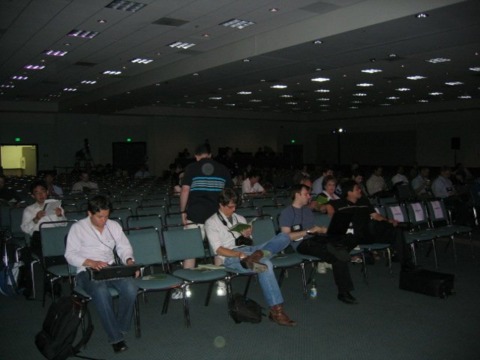E3 2008: ESA keynote long on rhetoric, short on attendance
Lobby president Michael Gallagher addresses a sparse crowd amid growing concerns of the organization's future and relevance.
When Entertainment Software Association president Michael Gallagher took the stage for his keynote address today, he did so amid growing concerns over the future the ESA's E3 Media & Business Summit. Just as the industry had become used to the idea that the new E3 would not resemble the massive pre-2007 trade show, the representative body and its head have been plagued by a number of high-profile setbacks.

Namely, the ESA was dealt a debilitating blow when Activision Blizzard--the newly formed superpublisher that combined Guitar Hero maker Activision and Blizzard Entertainment parent Vivendi Games--abruptly announced in May that it was leaving the ESA and would not attend this year's E3. Last night, the publisher unabashedly cashed in on the traditional hype by holding its own press junket just down the road from the ESA's event. Activision Blizzard was quickly followed by a number of other high-profile game companies, including LucasArts, id Software, and Crave Entertainment.
With those events hovering Gallagher took the stage to deliver his E3 keynote, just hours after Texas Governor Rick Perry's conference address drew a tiny crowd at the Los Angeles Convention Center. At that event, which has had industry watchers perplexed from the moment Perry's appearance was announced in May, a sparse handful of attendees--under 50--sat down in an vast auditorium equipped to easily support 1,000.
Gallagher's keynote appeared to have more spectators on hand, although that might have been because it was held in a far smaller conference auditorium. The executive began by thanking Perry for his speech, saying that he wished more politicians supported the gaming industry with the same resolute conviction.
Gallagher then launched into his prepared remarks, posing the audience with the question, "In what year did the television become an accepted part of the American landscape?" He then segued this hypothetical into the assertion that people living in dynamic times are afflicted with a myopic view of their immediate surroundings. "I believe that in some time in the future, we will look back and see that now is the time that gaming is becoming an accepted part of our culture," he said.
Then, the presenter took a jab at former ESA boss Doug Lowenstein, saying, "In my predecessor's time, our organization was fighting politicians, not having them embrace us." Gallagher, a former official in the George W. Bush administration, stepped in as ESA president and CEO in 2007, following Lowenstein's 2006 exit.
Getting back to the games, Gallagher continued, "The evolution of game content is revolutionary, and key to the industry's growth." The ESA head then regaled the audience with a number of statistics, distilling to the point that new genres are fueling a wider acceptance by a broader market. In addition to kid-centric gaming, he noted such serious games as the cancer simulator Re-Mission and antihunger strategy Food Force as fueling the industry's outward expansion.
"The wide variety of content our industry produces will only expand, as researchers find more uses for the games our industry advances," said Gallagher. "Grants to study the positive impact of video games, we have indeed come a long way."
Gallagher made special note of the Nintendo Wii, which he believes has had a substantially positive impact on how the gaming industry is perceived. "Nintendo's Wii has helped revolutionize our industry. By creating games that make physical activities fun, we've tapped into new audiences," he declared, He also called out Sony's folding@Home program, made possible by the cloud-processing power of networked PlayStation 3."
"All this from an entertainment source once considered just a pastime for teenage boys," he mused.
Gallagher then hit a stride with his tried-and-true industry sales statistics dump. Referencing to the game industry's $19 billion US haul in 2007, Gallagher noted, "an astonishing nine games were sold every second of every day last year." He also mentioned that the industry employs more than 80,000 people in 31 states with a total compensation of $2.2 billion, and that figure is expected to rise to 250,000 workers by 2009.
"I believe we are in the golden age of gaming," Gallagher said, saying corporate America has begun to support the industry with as much enthusiasm as the public.

However, all is not perfect with the industry, Gallagher cautioned. He laid out five calls to action that he believes will further the industry's interests and continue fueling growth. "We must never forget our core customers," he began saying it was vital to "remember our base." At the same time, the industry must "welcome new gamers," by creating content that appeals to them. The industry must "broaden the use of games," according to Gallagher. Indirectly calling out the string of ESA departures, Gallagher lastly noted that the industry must "unite to support our policy interests."
As the gaming industry's largest lobbying group, that last call to action is the most vital to sustain the organization. Gallagher went on to push the ESA's objectives, reiterating its stance on rating self-regulation by way of the ESA-run Entertainment Software Rating Board. Gallagher praised the ESRB's efforts, citing a recent FTC report that indicated game ratings were more effective at keeping unsuitable content out of the hands of minors than comparable entertainment systems.
Gallagher closed by urging everyone to make their voice heard on Capitol Hill by joining the Video Game Voters Network, saying he wanted "to see the number of registered users hit 200,000 by next year's E3." That is, of course, assuming there is an E3 next year...
Got a news tip or want to contact us directly? Email news@gamespot.com
Join the conversation